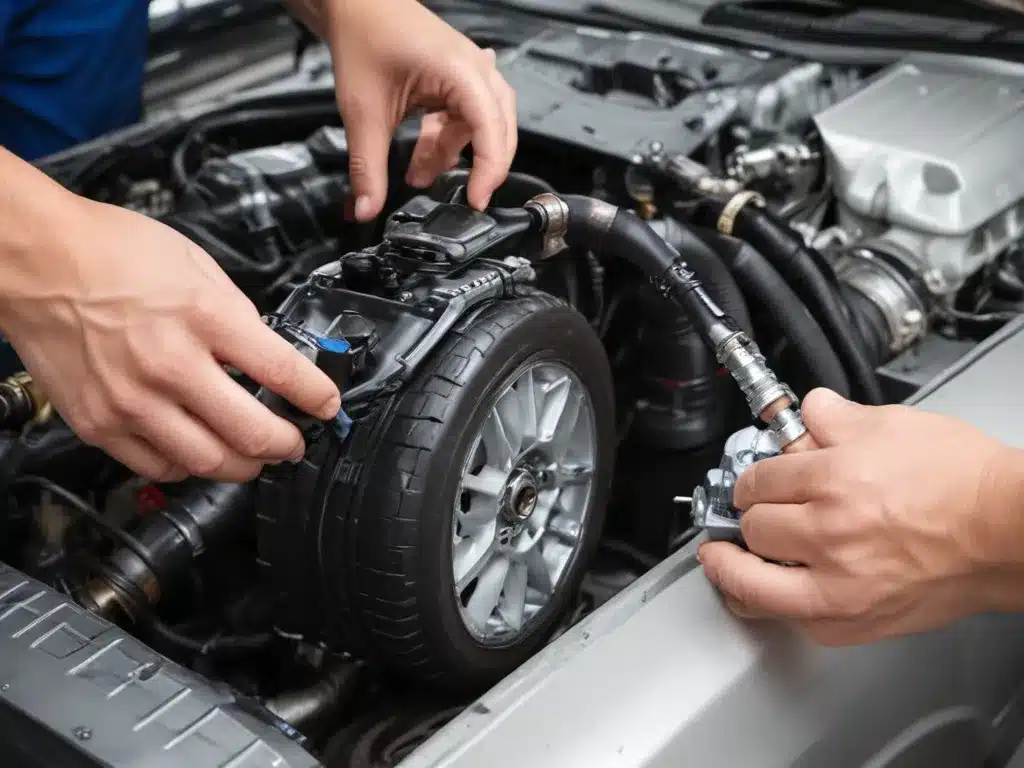
The Lifeblood of Your Ride
As a proud car owner, I can’t help but feel a certain connection to my vehicle. It’s not just a mode of transportation – it’s a trusted companion that’s been with me through thick and thin. And when it comes to keeping that beloved chariot of mine in tip-top shape, I’ve learned that the secret lies in the fluids that flow through its veins.
You see, your car is kind of like a high-performance athlete. It needs the right fuel, the right lubrication, and the right coolant to operate at its best. Neglect any of those essential fluids, and you might as well bench your ride and start walking. But fear not, my fellow gearheads, for I’m here to dive deep into the world of automotive fluids and share my hard-earned wisdom.
The Fuel that Fires Your Pistons
Let’s start with the obvious one – fuel. Whether you’re pumping in good old-fashioned gasoline or the latest eco-friendly alternative, your car’s engine needs a steady supply of this liquid gold to keep those pistons pumping and the wheels turning. But it’s not just about the quantity; the quality of your fuel matters too.
Imagine if you tried to power your car with, I don’t know, maple syrup. (Hey, don’t laugh – I’ve heard of stranger things!) Sure, it might get you a few miles down the road, but eventually, that sticky mess would clog up your fuel system and leave you stranded on the side of the highway. The same goes for using the wrong grade of gasoline or mixing different types. You’ve gotta stick to the good stuff, my friends, or risk some serious engine trouble.
The Lifeblood of Your Engine
Now, let’s talk about the unsung hero of your car’s inner workings: engine oil. This magical elixir is the lifeblood of your engine, providing the essential lubrication that keeps all those metal parts from grinding against each other and seizing up. Without it, your engine would be like a boxer with no gloves – a recipe for a knockout punch to your wallet.
But it’s not just any old oil that’ll do the trick. Nope, you’ve gotta use the right type and grade, as recommended by your car’s manufacturer. And don’t forget to change it at the proper intervals, too. I know, I know, it’s a hassle, but trust me, it’s a small price to pay to keep your engine running like a well-oiled machine. (Pun intended, of course!)
The Coolant that Keeps Your Engine Chill
Speaking of well-oiled machines, let’s not forget about the importance of coolant. This colorful liquid is the unsung hero of your car’s temperature regulation system, keeping your engine from turning into a molten mess of metal and plastic. Without it, your engine would quickly overheat, leaving you stranded on the side of the road with a cloud of steam billowing from under the hood.
Now, I know what you’re thinking: “But doesn’t my car have a water pump and radiator to keep things cool?” Well, you’re absolutely right. But the truth is, those components can only do their job effectively if they’re properly lubricated and protected by the right coolant. And just like with engine oil, you’ve gotta use the specific type of coolant recommended for your vehicle. Mixing and matching can lead to all sorts of problems, from corrosion to decreased cooling efficiency.
The Unsung Hero: Transmission Fluid
While we’re on the topic of essential fluids, let’s not forget about the often-overlooked transmission fluid. This slippery stuff is the lifeblood of your car’s gearbox, ensuring smooth, seamless gear changes and protecting all those intricate internal components from wear and tear.
Neglect your transmission fluid, and you might as well start shopping for a new transmission – trust me, that’s a repair bill you do not want to see. And just like with engine oil and coolant, you’ve gotta use the right type of transmission fluid for your car. Mixing and matching can cause all sorts of issues, from jerky gear changes to complete transmission failure.
The Braking Power: Brake Fluid
Last but certainly not least, we’ve got the unsung hero of your car’s safety system: brake fluid. This often-overlooked liquid is the driving force behind your car’s braking system, transferring the pressure from your foot on the pedal to the calipers that grip your wheels and bring you to a stop.
Without the right brake fluid, your brakes would feel spongy and unresponsive, putting you and your passengers at risk. And just like the other fluids we’ve discussed, you’ve gotta use the specific type recommended for your vehicle. Mixing and matching can lead to all sorts of problems, from corrosion to decreased braking performance.
The Bottom Line
At the end of the day, your car’s essential fluids are the unsung heroes that keep your ride running smoothly and safely. From fuel to engine oil, coolant to transmission fluid, each one plays a crucial role in the overall health and performance of your vehicle.
So, the next time you’re tempted to skip that routine oil change or put off that coolant flush, remember the wise words of a seasoned car enthusiast: Don’t overlook the fluids that keep your car going strong. After all, your ride deserves the very best, and with a little bit of care and attention, you can keep it running like a dream for years to come.
And if you’re ever in need of a little help with your car’s essential fluids, I highly recommend checking out AutoOilAndFluid.com. They’ve got a wealth of information and resources to help you keep your ride in top shape, and their expert technicians are always happy to lend a hand. Happy driving, my friends!


